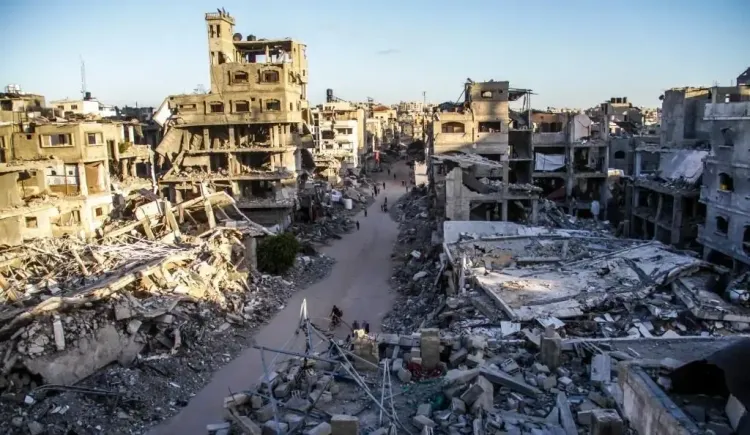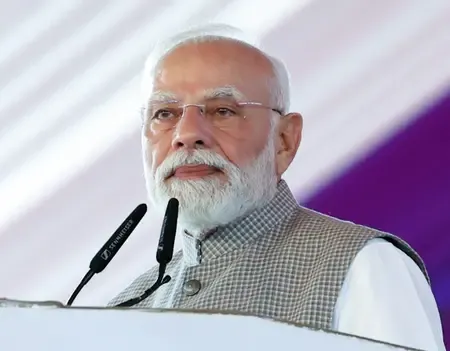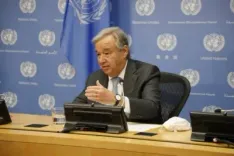Why is Russia Regretting the UN's Inaction on the Gaza Conflict?

Synopsis
Key Takeaways
- Russia criticizes the UN Security Council for its inaction on Gaza.
- Repeated vetoes by the U.S. have paralyzed the council's efforts.
- The humanitarian crisis in Gaza is escalating, with significant civilian suffering.
- Russia advocates for a fair resolution to the Palestinian issue.
- International condemnation is growing against the U.S. veto.
Moscow, Sep 20 (NationPress) The Russian Foreign Ministry has voiced its disappointment regarding the United Nations Security Council's failure to put an end to the ongoing violence and humanitarian distress in the Gaza Strip, attributing this to the repeated vetoes issued by the United States.
"The UN Security Council's failure to halt the bloodshed and alleviate the plight of civilians is profoundly regrettable and disheartening," the ministry remarked in a statement on its official website on Friday.
On Thursday, a coalition of non-permanent members of the Security Council made yet another attempt to pass a resolution advocating for a ceasefire in Gaza, the release of hostages, and the facilitation of humanitarian aid.
All members, except the United States, supported the draft resolution, which marked the seventh time the U.S. exercised its veto since the onset of the crisis, according to Xinhua news agency.
The Ministry reaffirmed that Russia's stance on the Israeli-Palestinian conflict remains steadfast. While condemning the attack by Hamas on October 7, 2023, Moscow stated that this incident "cannot and must not serve as a justification for the collective punishment of Palestinian civilians or escalate a wider war in the Middle East."
Russia holds the belief that attaining true peace and security in the region is unattainable without a fair resolution of the Palestinian issue and the acknowledgment of the legitimate rights and aspirations of the Palestinian people, as emphasized by the ministry.
Previously, on September 18, the U.S. vetoed a UN Security Council draft resolution aimed at compelling Israel to immediately lift all humanitarian access restrictions in Gaza.
This draft also called for an immediate, unconditional, and permanent ceasefire in Gaza, along with the immediate, dignified release of all hostages held by Hamas and other armed factions.
The proposal, presented by the ten elected members of the Security Council, garnered 14 votes in favor within the 15-member council, with the U.S., a permanent member, exercising its veto.
The veto from the U.S. faced significant criticism within the Security Council.
Algerian UN Ambassador Amar Bendjama remarked that the 14 council members who supported the draft resolution acted in good conscience, reflecting the sentiments of international public opinion.
"Once again, this council has failed -- another blemish on the conscience of humanity," he stated, adding that it is shameful in light of the genocide unfolding before our eyes.
Somali UN Ambassador Abukar Dahir Osman characterized the voting outcome as "a profound moral failure," asserting that the draft was rooted in the very language and spirit of the UN Charter, which all member states have pledged to uphold. Despite this, the Security Council has repeatedly been impeded from taking action.
Russian UN Ambassador Vassily Nebenzia stated that no significant progress on the Middle East issue would occur as long as Washington's view of the Gaza crisis remains unchanged, and as long as it perceives multilateral diplomacy at the UN as an obstacle rather than a vital tool.
"The UN Security Council will continue to be a powerless observer to this catastrophe, not hindered by any inherent structural flaw, but rather by the will, or lack thereof, of a single delegation," he remarked.
In response to the U.S. assertion that the draft resolution, if passed, would undermine on-ground diplomacy, Nebenzia highlighted Israel's attack on Qatar, a key mediator in the Gaza conflict, as evidence of Israel's disinterest in peace.
He concluded, "That action was, in essence, an assault on the very concept of reaching an agreement. It discredited any claims that Israel is genuinely ready to engage in diplomacy and arrive at a settlement. Blaming Hamas for derailing the talks, as our American colleagues have consistently done, is utterly nonsensical."
British UN Ambassador Barbara Woodward also expressed regret over the Security Council's inability to achieve consensus on the draft resolution.
"We need a ceasefire now more than ever. Yet, Israel's reckless escalation of military operations is distancing us from a resolution that could bring the hostages home and alleviate the suffering in Gaza," she remarked.
"We are witnessing a completely manufactured famine in Gaza as images emerge of starving Palestinians perishing while desperately searching for food for their families," she added.
"We urge the Israeli government to cease the bloodshed, which has already claimed the lives of 65,000 Palestinians, and to immediately lift its restrictions on aid entry, allowing the UN and humanitarian organizations to save lives."









